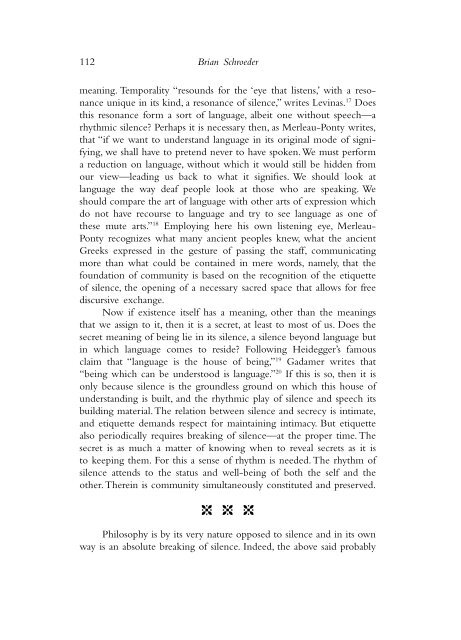Create successful ePaper yourself
Turn your PDF publications into a flip-book with our unique Google optimized e-Paper software.
112 Brian Schroeder<br />
meaning. Temporality “resounds for <strong>the</strong> ‘eye that listens,’ with a resonance<br />
unique in its kind, a resonance <strong>of</strong> silence,” writes Levinas. 17 Does<br />
this resonance form a sort <strong>of</strong> language, albeit one without speech—a<br />
rhythmic silence? Perhaps it is necessary <strong>the</strong>n, as Merleau-Ponty writes,<br />
that “if we want to understand language in its original mode <strong>of</strong> signifying,<br />
we shall have to pretend never to have spoken. We must perform<br />
a reduction on language, without which it would still be hidden from<br />
our view—leading us back to what it signifies. We should look at<br />
language <strong>the</strong> way deaf people look at those who are speaking. We<br />
should compare <strong>the</strong> art <strong>of</strong> language with o<strong>the</strong>r arts <strong>of</strong> expression which<br />
do not have recourse to language and try to see language as one <strong>of</strong><br />
<strong>the</strong>se mute arts.” 18 Employing here his own listening eye, Merleau-<br />
Ponty recognizes what many ancient peoples knew, what <strong>the</strong> ancient<br />
Greeks expressed in <strong>the</strong> gesture <strong>of</strong> passing <strong>the</strong> staff, communicating<br />
more than what could be contained in mere words, namely, that <strong>the</strong><br />
foundation <strong>of</strong> community is based on <strong>the</strong> recognition <strong>of</strong> <strong>the</strong> etiquette<br />
<strong>of</strong> silence, <strong>the</strong> opening <strong>of</strong> a necessary sacred space that allows for free<br />
discursive exchange.<br />
Now if existence itself has a meaning, o<strong>the</strong>r than <strong>the</strong> meanings<br />
that we assign to it, <strong>the</strong>n it is a secret, at least to most <strong>of</strong> us. Does <strong>the</strong><br />
secret meaning <strong>of</strong> being lie in its silence, a silence beyond language but<br />
in which language comes to reside? Following Heidegger’s famous<br />
claim that “language is <strong>the</strong> house <strong>of</strong> being,” 19 Gadamer writes that<br />
“being which can be understood is language.” 20 If this is so, <strong>the</strong>n it is<br />
only because silence is <strong>the</strong> groundless ground on which this house <strong>of</strong><br />
understanding is built, and <strong>the</strong> rhythmic play <strong>of</strong> silence and speech its<br />
building material. The relation between silence and secrecy is intimate,<br />
and etiquette demands respect for maintaining intimacy. But etiquette<br />
also periodically requires breaking <strong>of</strong> silence—at <strong>the</strong> proper time. The<br />
secret is as much a matter <strong>of</strong> knowing when to reveal secrets as it is<br />
to keeping <strong>the</strong>m. For this a sense <strong>of</strong> rhythm is needed. The rhythm <strong>of</strong><br />
silence attends to <strong>the</strong> status and well-being <strong>of</strong> both <strong>the</strong> self and <strong>the</strong><br />
o<strong>the</strong>r. Therein is community simultaneously constituted and preserved.<br />
� � �<br />
Philosophy is by its very nature opposed to silence and in its own<br />
way is an absolute breaking <strong>of</strong> silence. Indeed, <strong>the</strong> above said probably
















